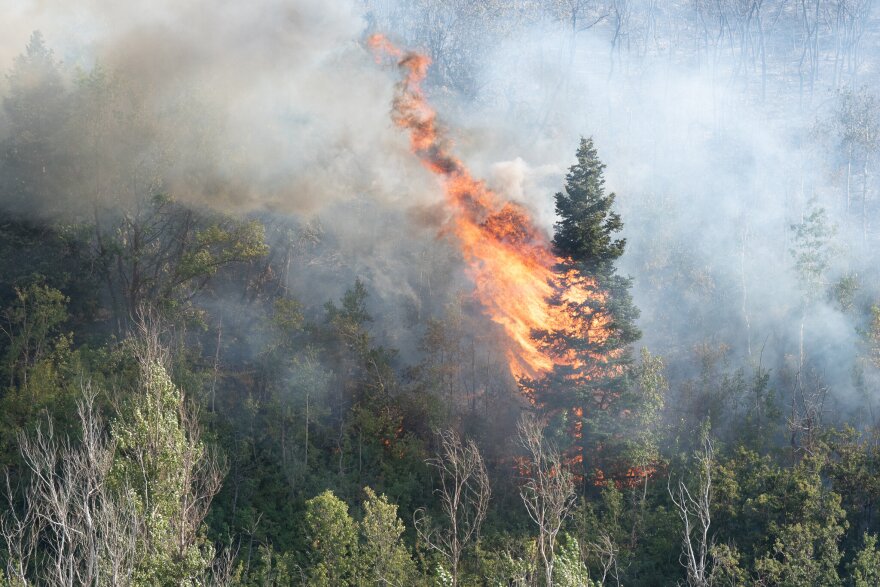Tucked into an announcement of $4.6 million in grants to reduce forest fire fuels in Summit County was a $60,000 item described as a “Green Energy Biomass Facility Analysis.”
What, exactly, is a biomass facility? County Councilor Glenn Wright described one version that would make jet fuel out of material like dead trees and so-called “ladder fuels” — the sort of wood products that contribute to devastating wildfires that the county is hoping to remove from local forests.
Wright said a biomass facility could turn those wood products into something marketable, providing a financial incentive and an alternate way of accomplishing costly projects.
“The whole idea behind it is to put an economic basis behind our forest health initiatives,” Wright said. “If we're going to rely on federal and state funds for every bit of, essentially, forest clearing we do, we're never really going to get the job done in any timely manner. We'll barely stay ahead of it.”
Forest fires can be catastrophic for rivers that run through affected areas. Officials have said one of the chief reasons to prevent catastrophic fires in Summit County is to protect the state’s drinking water, much of which originates here.
Treatments include thinning forests, removing dead trees, creating fuel breaks and clearing underbrush that can spur a ground fire to jump into the treetops.
Summit County Public Lands Manager Jessica Kirby has identified 73,000 acres to treat to protect the headwaters of the Weber River. At $2,500 per acre — which some say is a low estimate — it would cost more than $182 million to treat the whole area. That's triple Summit County's annual operating budget.
Wright and others hope a biomass facility could incentivize companies to remove the problematic fuel from the forest to use for a profitable venture.
The $60,000 grant pays for a contractor to study whether Summit County forests have fuels that private industry could use for a profit, and Kirby was optimistic about the project’s potential.
“I think it's awesome,” Kirby said earlier this month. “We are just getting into a contract right now with a company called Ecostrat and they're going to do an analysis of a 75-mile radius from, kind of, (the) Coalville area.”
The study area includes the Weber headwaters, much of the Uinta-Wasatch-Cache National Forest and significant stretches of both the Wasatch Back and Wasatch Front.
Julie Kies, a U.S. Forest Service wood and biomass utilization coordinator, said there is no predetermined end product for the fuels in Summit County’s forests. She said the study could find materials suitable for products ranging from pellets for wood stoves to biochar for industrial agriculture to traditional lumber to, yes, sustainable aviation fuel.
“The idea is that the county will have this assessment that kind of goes over this due diligence of, you know, do they have kind of three essential pillars of what might make a business make a strong go in a community that would be a wood bio-based business?” she said.
Kies said the study is one of the first deep dives into the issue in Utah, and that a facility like Wright envisions would be the first in the state.
Kirby said the study will consider the accessibility of potential fuels — if they’re on steep hillsides and if road networks exist to travel to them, for example. Kies said the study would also consider whether there’s a local workforce to staff a biomass facility.
While some other communities around the country are considering similar initiatives, Kies said it’s industry professionals who are paying close attention to studies like this to find areas to set up businesses.
“I think probably more so who's looking around are biofuel developers and potential investors," Kies said. "Technology providers are scoping out communities across the country to see who might have feedstock and have, sort of, the right pieces in place to make it make sense for them to invest in building up the infrastructure.”
Wright said the county might be well-positioned for a facility of this kind.
“Economically, it's the only way we're going to solve our forest health issues," he said. "I think there's significant opportunities for us if it becomes economically viable. Delta Airlines has a goal to be 100% bio jet fuel in the next 20 years. And they have some interim guidelines where they’d like to gradually get up to that point. With our proximity to Salt Lake airport and one of their hubs, I would think this would be a viable project. But we shall see.”
In the meantime, the county continues to pursue traditional forest health initiatives and projects to remove problematic fuels. Kirby said $6.2 million in grants have been raised over the last year, and she expects more to come in shortly.


